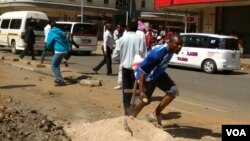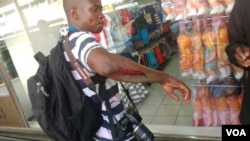Dozens of people, including journalists, were seriously injured in the Zimbabwean capital Harare on Wednesday following clashes between police and anti-government protestors who were pressing President Robert Mugabe’s government to halt its plan to introduce bond notes as the cash crisis continues.
The protestors also called on the Zimbabwean strongman to step down immediately for allegedly failing to run the southern African country.
Heavily-armed police details pounced on about 2,000 placard-carrying demonstrators who were marching to the Ministry of Finance and parliament to present a petition of their grievances.
The police assaulted the peaceful marchers with baton sticks resulting in the protestors retaliating with stones leading to running street skirmishes. During the disturbances, a makeshift police station located in Harare’s central business district had its windows smashed by the protestors.
The anti-riot police then fired teargas and used water cannons to disperse the demonstrators who passed through President Mugabe’s office chanting “Mugabe Must Go.”
The police also used the water cannons to disperse people at the headquarters of the main opposition Movement for Democratic Change where former Prime Minister Morgan Tsvangirai was holding a meeting with his party’s leadership.
The protest was crushed by police despite an order granted by the country’s High Court on Tuesday ordering the compelling the police to respect the marchers. The court interdict was issued after police had initially indicated that they would not allow the demonstrators to stage the planned protests.
One of the leaders of the protest, Jacob Ngarivhume, condemned the police action.
“The march was going on very well and peacefully until the police, despite a court permission for us to march, descended on the marchers in the process they (the police) injured dozens of marchers and journalists who were carrying out their duties” said Ngarivhume.
Foster Dongozi, secretary general of the Zimbabwe Union of Journalists, criticized the police for assaulting journalists.
“So far we have received reports that five journalists were injured while some had their equipment damaged. We urge authorities to ensure that journalists are protected during the course of their work and we also condemn the police for brutally attacking members of the press,”
said Dongozi.
Spokesperson of the #Tajamuka-Sesijikile Campaign, Promise Mkwananzi, said the police action was “a serious indictment” on President Mugabe, adding that the government should respond to the demands of citizens.
“This is just a start as we said we will build and escalate as we draw close to our August 31 deadline for Mugabe to step down,” said
Mkwananzi said, “We want to warn the police against acting unlawfully and brutally towards lawful and peaceful citizens who have permission to express their legitimate concerns against the government. Mugabe and his government need to step aside and allow citizens to rebuild their country.”
Police spokesperson Senior Assistant Commissioner Charity Charamba told Studio 7 by phone that the protestors were the ones that attacked the police first.
“Our officers only acted in self-defense after the demonstrators started throwing stones at them. We will not allow lawlessness in this country,” said Charamba.
The government plans introduce bond notes in October this year backed by a $200 million Africa Import and Export Bank facility as an incentive for exporters to produce more goods, which will in turn generate the much-needed foreign currency for the country.
But many Zimbabweans suspect that the authorities are planning to bring the Zimbabwean currency through the back door.
Zimbabwe’s historic hyperinflation forced the country to abandon its local dollar resulting in it adopting a multiple currency system in 2009.






